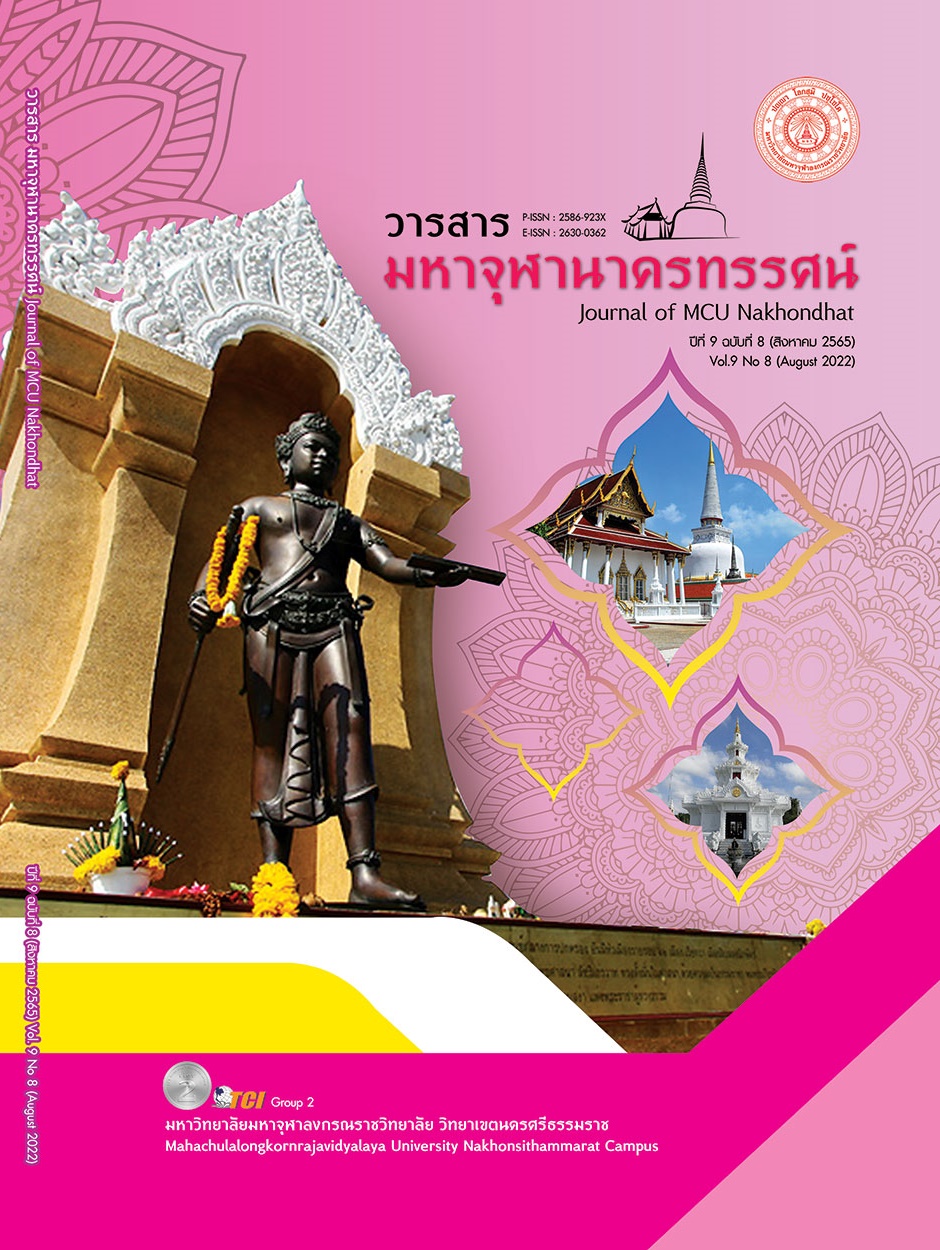A MODEL FOR STRENGTHENING PROFESSIONAL ETHICS OF ENGINEERS BUDDHIST INTEGRATION
Main Article Content
Abstract
A research paper titled “A model for strengthening professional ethics of engineers Buddhist integration” has research objectives as follow: 1) to study practices, duties, code of ethics, and case studies in accordance with decision of etiquette committee from Council of Engineers, 2) to study Buddhadhammaprinciples to reinforce their strength on engineers’ code of ethics, and 3) to propose a model that helps strengthening professional ethics of engineers with Buddhist integration. This paper is qualitative research using documents and in-depth interview with 17 professionals, and analyze data by adopting content analysis, as well as descriptive analysis presentation.The result of a research indicates that some engineers still perform their duties by not adhering the code of ethics, which means that current engineers’ code of ethics may not be strong enough as many engineers still break the code of ethics. Therefore, Buddhadhamma principles are important to reinforce a strength on engineers’ code of ethics more completely by applying The Threefold Training, Moral Shame/Moral Dread, Four Iddhipada, YonisoManasikara, Consciousness, and Right Livelihood Principles.A framework for strengthening professional ethics of engineers Buddhist integration consists of 3 aspects; 1) honesty by integrating the Treefold Training, Moral Shame/Moral Dread, and Right Livelihood principles. 2) work competency by integrating Buddhadhamma, the Threefold Training, Four Iddhipada, Consciousness, and YonisoManasikara principles, and 3) interaction by integrating Buddhadhamma, the Threefold Training, and Moral Shame/Moral Dread principles. A researcher designed a relationship formula Y = a1X1 +a2X2 +a3X3 + X4 +a5X5 +X6. Eventually, results from this research are massively beneficial to engineers’ society such as helping engineers perform their duties under code of ethics as well as Buddhadhamma principles, and being a moral engineer with trust and reliability. So that engineers can maintain their pride and dignity, as well as being accepted in the society
Article Details

This work is licensed under a Creative Commons Attribution-NonCommercial-NoDerivatives 4.0 International License.
References
ตวงเพชร สมศรี. (2556). วิธีการพัฒนาจริยธรรมของข้าราชการตำรวจเชิงพุทธบูรณาการ. ใน วิทยานิพนธ์พุทธศาสตรดุษฎีบัณฑิต สาขาวิชาพระพุทธศาสนา. มหาวิทยาลัยมหาจุฬาลงกรณราชวิทยาลัย.
ไทยรัฐออนไลน์. (2564). คอนโด 12 ชั้นในไมอามีพังถล่มบางส่วน ดับ 1 ศพ สูญหาย 99 คน. เรียกใช้เมื่อ 19 มิถุนายน 2565 จาก https://www.thairath.co.th/news/foreign/
พระเทพโสภณ (ประยูร ธมฺมจิตฺโต). (2548). ขอบฟ้าแห่งความรู้. (พิมพ์ครั้งที่ 2). กรุงเทพมหานคร: สำนักพิมพ์อัมรินทร์.
พระอธิการภัทรชาพงษ์สิริภทฺโท. (2560). ชาชีพการเงินการบัญชีในวิถีทางพระพุทธศาสนา. วารสารบัณฑิตศึกษามหาจุฬาขอนแก่น, 4(1), 84-93.
มหาจุฬาลงกรณราชวิทยาลัย. (2539). พระไตรปิฎกภาษาไทยฉบับมหาจุฬาลงกรณราชวิทยาลัย.(ที.ม.(ไทย) 11/304/253), (อภิ.วิ. (ไทย) 35/524/393). กรุงเทพมหานคร: โรงพิมพ์มหาจุฬาลงกรณ.
ราชกิจจานุเบกษา. (2551). ข้อบังคับสภาวิศวกรว่าด้วยหลักเกณฑ์และคุณสมบัติของผู้ประกอบวิชาชีพวิศวกรรมควบคุมแต่ละระดับสาขาวิศวกรรมโยธา พ.ศ. 2551 หน้า 23. เล่ม 125. ตอนพิเศษ 178 ง.
ราชกิจจานุเบกษา. (2559). ข้อบังคับสภาวิศวกรว่าด้วยจรรยาบรรณแห่งวิชาชีพวิศวกรรมและการประพฤติผิดจรรยาบรรณอันจะนำมาซึ่งความเสื่อมเสียเกียรติศักดิ์แห่งวิชาชีพ พ.ศ. 2559 หน้า 6. เล่ม 133. ตอนพิเศษ 54 ง.
วริยา ชินวรรโณ. (2546). จริยธรรมในวิชาชีพ. กรุงเทพมหานคร: สำนักงานกองทุนสนับสนุนการวิจัย.
วารีพร อยู่เย็น. (2562). การพัฒนาจรรยาบรรณของผู้ประกอบวิชาชีพบัญชีเชิงพุทธบู(มหาจุฬาลงกรณราชวิทยาลัย, 2539)รณาการ. ใน ดุษฎีนิพนธ์พุทธศาสตรดุษฎีบัณฑิต สาขาวิชาพระพุทธศาสนา. มหาวิทยาลัยมหาจุฬาลงกรณราชวิทยาลัย.
สยามรัฐออนไลน์. (2562). วันนี้ในอดีต 26 ปีช๊อคโลก!! เรียกใช้เมื่อ 2565 มิถุนายน 19 จาก https://siamrath.co.th/n/96704
สิงห์ชัย อรุณวุฒิพงศ์. (2549). แนวทางการปลูกฝังจรรยาบรรณวิชาชีพในประเทศไทย. ใน ดุษฎีนิพนธ์การจัดการธุรกิจ สาขาวิชาพระพุทธศาสนา. มหาวิทยาลัยราชภัฏสวนดุสิต.


